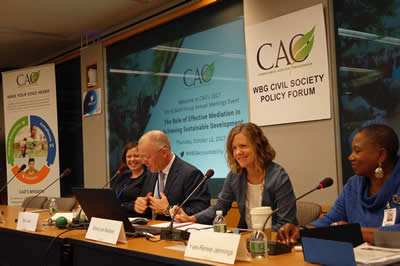CAO Holds Session During Annual Meetings on the Challenges of Mediation

October 19, 2017 - CAO organized a policy session on the use of mediation in addressing local community–company disputes during the October 2017 World Bank Group Annual Meetings. The session, “The Role of Effective Mediation in Achieving Sustainable Development,” was held at the Civil Society Policy Forum. It began with the screening of a short film which vividly portrays how a CAO dispute resolution process in Nicaragua helped 2,000 former sugar cane workers and their families address an epidemic of chronic kidney disease in their community. The film was followed by a discussion on the opportunities and challenges for promoting successful dispute resolution at the local level.
The panel was composed by: Kristen Genovese (Senior Researcher, Centre for Research on Multinational Corporations / SOMO); Rob Carss (Petroleum Geologist, Opal Consulting Limited); Yves-Renee Jennings (Mediator, Partners for Sustainable Peace); and Gina Barbieri (Principal Specialist Ombudsman, CAO) who facilitated the session. Unlike traditional sessions in which panelists make presentations, the discussion began with audience reactions to the film and questions to the panelists. Panelists then drew on their own diverse mediation experiences to reflect on the tools and approaches used in the Nicaragua case, and more broadly on the challenges and opportunities involved in building a foundation for dialogue, seeking agreement, and implementing sustainable local development solutions through enhanced community-company engagement.
Several other compelling issues were raised during the discussion including what factors and incentives encourage IFC-financed companies to seek mediation. While companies are profit-driven and generally risk-adverse, reputational risks related to complex legacy issues and strong community opposition can compel companies to seek a mediated solution. In these cases, the application of IFC’s Performance Standards can serve as a strong incentive to bring company managers to the negotiating table. Another issue discussed is how difficult it can be for civil society activists to transition from ‘campaigning’ against a company to ‘dialoguing’ with it to find solutions. This is compounded by the fact that even in cases where acceptable solutions are found, there are often community members who are not satisfied with the outcome. For this reason, it is important for mediators to manage expectations up-front about what can be achieved through negotiations.
Finally, there was an interesting exchange about how mediation and arbitration are sometimes conflated to be the same. The panelists clarified that there are important differences in terms of process and outcomes. While in ‘mediation,’ the mediators determine the process and the stakeholders control the outcome, in ‘arbitration,’ the arbiter controls both the process and the outcome. CAO, thus, employs mediation because it is a more bottom-up and win-win approach which attempts to protect the rights and interests of both communities and companies.
